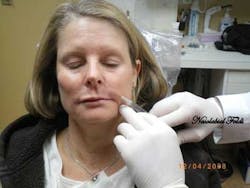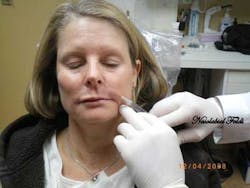Deployed dentistry
Contributed by Operation Tribute to FreedomU.S. Army Dental Specialists Spc. Samantha Shipley and Spc. Austin Williams traded their white lab coats for Army combat uniforms when they headed off to Iraq last year. Going beyond the confines of a pristine dental facility, Shipley and Williams provided dental care on the front lines. Working in a combat zone was no easy task, but Shipley and Williams were able to complete their mission of treating and tending to their fellow soldiers, as well as retired military members, civilian contractors, and local Iraqi nationals.
Spc. Samantha Shipley
Spc. Austin WilliamsBoth members of the 502nd Dental Company, Shipley and Williams overcame the various challenges of practicing dentistry in Iraq to treat a variety of dental cases each day. At times the soldiers’ work was routine, and others, it was quite anomalous. Some days the soldiers performed standard hygienic cleaning procedures, according to carefully scheduled appointments. Other days Shipley and Williams were called upon to treat emergency cases at a moment’s notice, as soldiers were rushed in from the field with combat injuries. Williams explained, "My most rewarding experience was suturing up a fellow soldier's lip after he was hit with a Sprite bottle of cement."The injured soldier had been out on a mission. When his convoy stopped, he got out of the vehicle and was attacked, suffering severe injuries after a blow to the face with the soda bottle of cement. The soldier was immediately taken to the base."When he arrived, he was rushed back to the dental chair, where we sutured his lip back together, took X-rays, and got the soldier out of pain," Williams said. "This experience wasn't the norm because it was a sick call procedure where you really could see the soldier in pain and you had to react quickly." "Since I have been deployed, I have seen three patients with a whole tooth that was knocked out," Shipley added. "One was a soldier who was on a mission. His armored vehicle hit a rock, causing him to hit his mouth on his M249 rifle."Some of the more common dental issues Shipley and Williams encountered throughout their deployment were ruptured wisdom teeth, temporomandibular joint disorder, and bruxism. As young dental specialists, each case provided a new learning opportunity for Shipley and Williams to better understand how to treat various dental problems and traumas. Working under unfavorable conditions with limited resources presented a variety of challenges for Shipley and Williams. The soldiers experienced everything from power outages in the middle of a procedure to having to treat various cases without the tools and supplies they are used to using in the states. However, the soldiers don’t let these issues get in the way of accomplishing their mission to provide the best dental care available to their comrades. Instead, the soldiers had to think on their feet to overcome each challenge and treat each case. “Being in Iraq, we don’t have and are not able to get everything some dentists are used to using, and you have to be ready for anything,” Shipley explained. “Working in Iraq has definitely made me more flexible, and I have learned what can substitute for what in a dental clinic.”Shipley and Williams, along with many other U.S. service members, are making a difference in the provision of dental care. The treatment they provide remains crucial to the health of our soldiers and allows them to serve our country to the best of their ability. In June 2010, Shipley and Williams returned to Fort Hood, Texas. This article was contributed by Operation Tribute to Freedom, an Army program that shares the individual stories of soldiers who have or are currently serving in support of Operation Iraqi Freedom and Operation Enduring Freedom. To find out more about the program, visit their Web site at www.army.mil/otf/.


